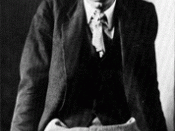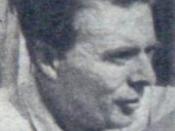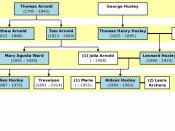A man has progressed through the ages with the purpose to arrive at a utopian society, where everyone is happy, disease is nonexistent, and strife, anger, or sadness are unheard of. Only happiness exists. But when confronted with Aldous Huxley's "Brave New World", we come to realize that this is not, in fact, what the human soul really wants. In fact, Utopian societies are much worse than those of today. In a utopian society, the individual, who among others composes the society, is lost in the world of uninterest. I would like to discuss the reasons why the Utopian society included banning of literature, world history, Christianity, democracy, and family life.
"Brave New World" is an unsettling, loveless and even sinister place. Huxley's Brave New World is a world without illness, grief, aging, hate, was, risk to safety, discomfort, famine, poverty, unhappiness, or range. It is also a world without families, literature, God, passion, solitude, individualism, rebellion, and the freedom to choose one's life.
The government believed that these things would destroy the stability of their world. The literature was banned because the government doesn't want people to think and to get new potentially dangerous ideas. Also, in literature we can find information about our past societies, love, feelings and freedom. If utopian people were allowed to read literature, they could find out something new that wasn't present in their "perfect" world. For example, if they would read Shakespeare's Romeo and Juliet they would find out what is to love somebody, to feel something in your heart. If they would read Bible, they would get knowledge about God and religion. All this information could destroy the main concept of their utopian society--stability and loyalty.
The other potentially dangerous source of knowledge that was banned is the...



OK.
Didnt really have much zing to it, wasn't really that enjoyable to read.
1 out of 1 people found this comment useful.